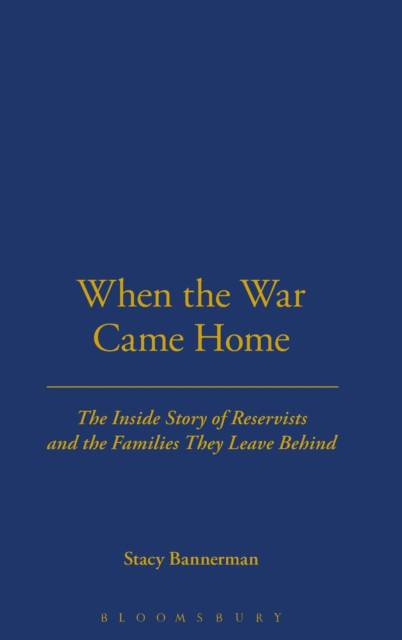
- Afhalen na 1 uur in een winkel met voorraad
- Gratis thuislevering in België vanaf € 30
- Ruim aanbod met 7 miljoen producten
- Afhalen na 1 uur in een winkel met voorraad
- Gratis thuislevering in België vanaf € 30
- Ruim aanbod met 7 miljoen producten
Zoeken
When the War Came Home
The Inside Story of Reservists and the Families They Leave Behind
Stacy Bannerman
Hardcover | Engels
€ 98,95
+ 197 punten
Omschrijving
In the ongoing war on terror, record numbers of Army National Guard reservists are being deployed overseas; more than 400,000 to date have been ordered into action. Nearly one fifth of them had already served their commitment to the U.S. Army, but through President Bush's stop-loss order, they have been forced to remain in Active Duty. Most of these reservists never thought they'd see war; some are blatantly opposed to it. Almost none are prepared for it; many are dangerously ill-equipped mentally, physically, and emotionally to wage war. They leave steady jobs and established careers, and they leave behind wives, husbands, partners, and families.
Stacy Bannerman is one of those left behind. When the War Came Home chronicles a journey that began when Stacy's husband Lorin, a forty-three-year-old Sergeant First Class who had never thought he'd be asked to wage war, was called to active duty as an Infantry Mortar Platoon Sergeant in October 2003 and remained on the front lines until spring 2005. When the War Came Home is Stacy's personal account of the emotional impact and oft-unreported realities of her home front experience during that time, something shared by thousands of reservists; spouses and partners. Unlike many of those others, Stacy has the singular viewpoint of being a high-profile career peace activist who ultimately finds herself at odds with her husband fighting on the front lines of Iraq. Stacy's voice and experience bridge the unique and the universal in a no-holds-barred memoir of war and of fighting for peace.
Specificaties
Betrokkenen
- Auteur(s):
- Uitgeverij:
Inhoud
- Aantal bladzijden:
- 240
- Taal:
- Engels
Eigenschappen
- Productcode (EAN):
- 9780826417954
- Verschijningsdatum:
- 8/03/2006
- Uitvoering:
- Hardcover
- Formaat:
- Ongenaaid / garenloos gebonden
- Afmetingen:
- 162 mm x 229 mm
- Gewicht:
- 494 g

Alleen bij Standaard Boekhandel
+ 197 punten op je klantenkaart van Standaard Boekhandel
Beoordelingen
We publiceren alleen reviews die voldoen aan de voorwaarden voor reviews. Bekijk onze voorwaarden voor reviews.











